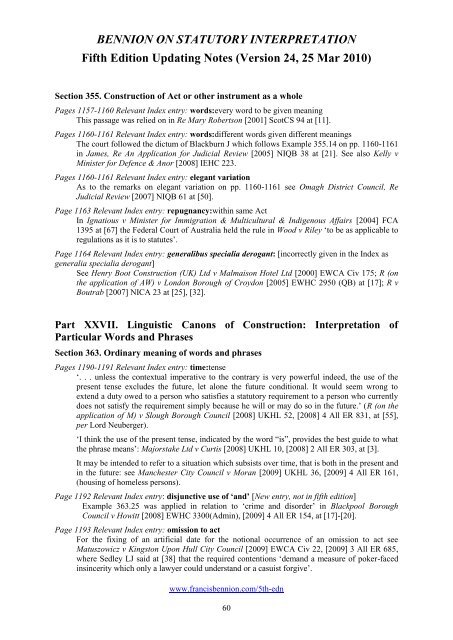BENNION ON STATUTORY INTERPRETATION ... - Francis Bennion
BENNION ON STATUTORY INTERPRETATION ... - Francis Bennion
BENNION ON STATUTORY INTERPRETATION ... - Francis Bennion
Create successful ePaper yourself
Turn your PDF publications into a flip-book with our unique Google optimized e-Paper software.
<strong>BENNI<strong>ON</strong></strong> <strong>ON</strong> <strong>STATUTORY</strong> INTERPRETATI<strong>ON</strong><br />
Fifth Edition Updating Notes (Version 24, 25 Mar 2010)<br />
Section 355. Construction of Act or other instrument as a whole<br />
Pages 1157-1160 Relevant Index entry: words:every word to be given meaning<br />
This passage was relied on in Re Mary Robertson [2001] ScotCS 94 at [11].<br />
Pages 1160-1161 Relevant Index entry: words:different words given different meanings<br />
The court followed the dictum of Blackburn J which follows Example 355.14 on pp. 1160-1161<br />
in James, Re An Application for Judicial Review [2005] NIQB 38 at [21]. See also Kelly v<br />
Minister for Defence & Anor [2008] IEHC 223.<br />
Pages 1160-1161 Relevant Index entry: elegant variation<br />
As to the remarks on elegant variation on pp. 1160-1161 see Omagh District Council, Re<br />
Judicial Review [2007] NIQB 61 at [50].<br />
Page 1163 Relevant Index entry: repugnancy:within same Act<br />
In Ignatious v Minister for Immigration & Multicultural & Indigenous Affairs [2004] FCA<br />
1395 at [67] the Federal Court of Australia held the rule in Wood v Riley „to be as applicable to<br />
regulations as it is to statutes‟.<br />
Page 1164 Relevant Index entry: generalibus specialia derogant: [incorrectly given in the Index as<br />
generalia specialia derogant]<br />
See Henry Boot Construction (UK) Ltd v Malmaison Hotel Ltd [2000] EWCA Civ 175; R (on<br />
the application of AW) v London Borough of Croydon [2005] EWHC 2950 (QB) at [17]; R v<br />
Boutrab [2007] NICA 23 at [25], [32].<br />
Part XXVII. Linguistic Canons of Construction: Interpretation of<br />
Particular Words and Phrases<br />
Section 363. Ordinary meaning of words and phrases<br />
Pages 1190-1191 Relevant Index entry: time:tense<br />
„. . . unless the contextual imperative to the contrary is very powerful indeed, the use of the<br />
present tense excludes the future, let alone the future conditional. It would seem wrong to<br />
extend a duty owed to a person who satisfies a statutory requirement to a person who currently<br />
does not satisfy the requirement simply because he will or may do so in the future.‟ (R (on the<br />
application of M) v Slough Borough Council [2008] UKHL 52, [2008] 4 All ER 831, at [55],<br />
per Lord Neuberger).<br />
„I think the use of the present tense, indicated by the word “is”, provides the best guide to what<br />
the phrase means‟: Majorstake Ltd v Curtis [2008] UKHL 10, [2008] 2 All ER 303, at [3].<br />
It may be intended to refer to a situation which subsists over time, that is both in the present and<br />
in the future: see Manchester City Council v Moran [2009] UKHL 36, [2009] 4 All ER 161,<br />
(housing of homeless persons).<br />
Page 1192 Relevant Index entry: disjunctive use of ‘and’ [New entry, not in fifth edition]<br />
Example 363.25 was applied in relation to „crime and disorder‟ in Blackpool Borough<br />
Council v Howitt [2008] EWHC 3300(Admin), [2009] 4 All ER 154, at [17]-[20].<br />
Page 1193 Relevant Index entry: omission to act<br />
For the fixing of an artificial date for the notional occurrence of an omission to act see<br />
Matuszowicz v Kingston Upon Hull City Council [2009] EWCA Civ 22, [2009] 3 All ER 685,<br />
where Sedley LJ said at [38] that the required contentions „demand a measure of poker-faced<br />
insincerity which only a lawyer could understand or a casuist forgive‟.<br />
www.francisbennion.com/5th-edn<br />
60

















